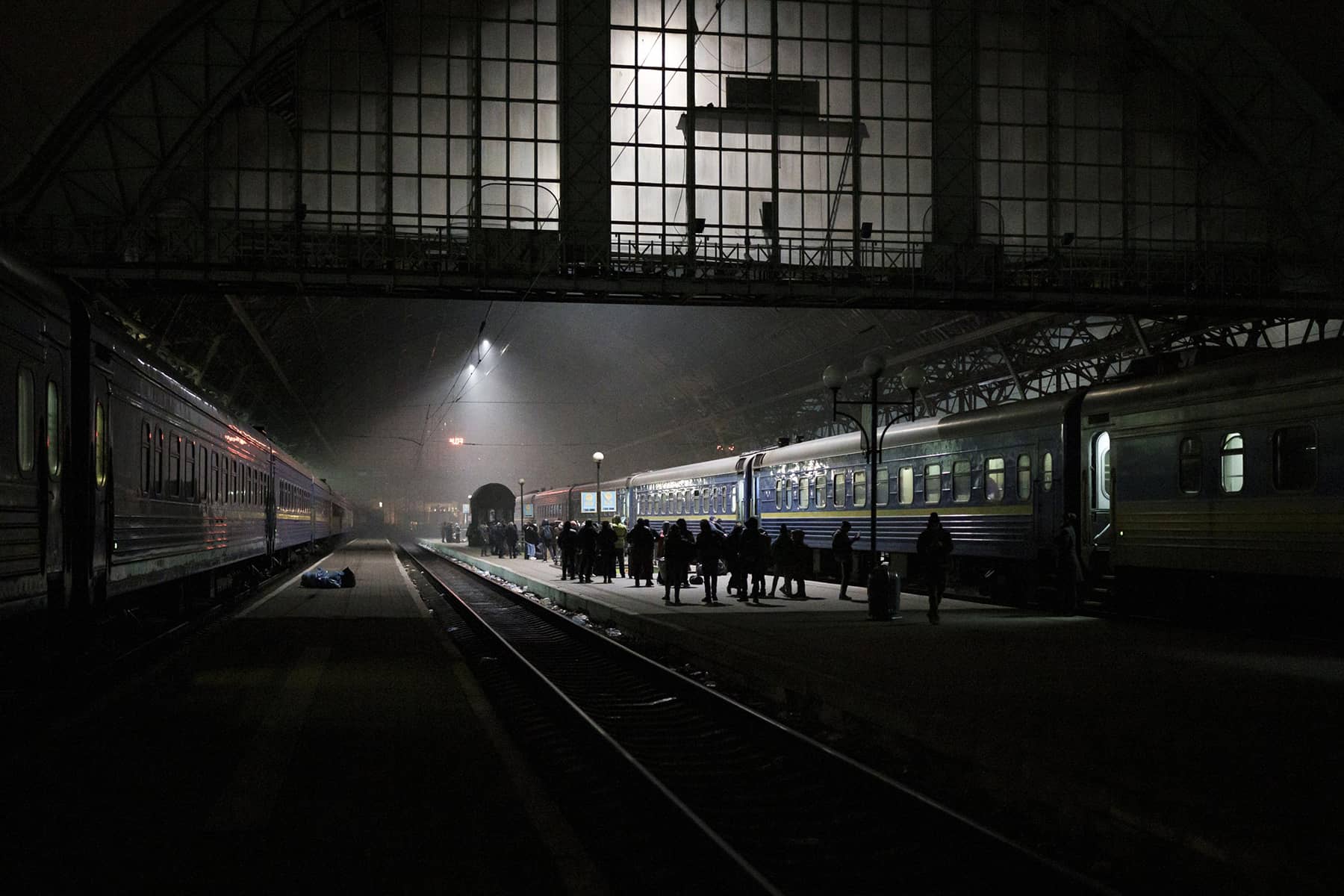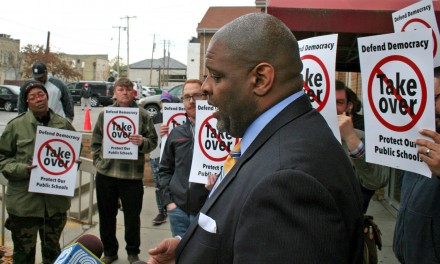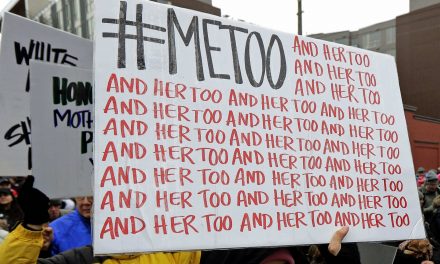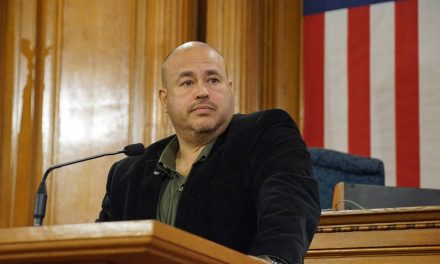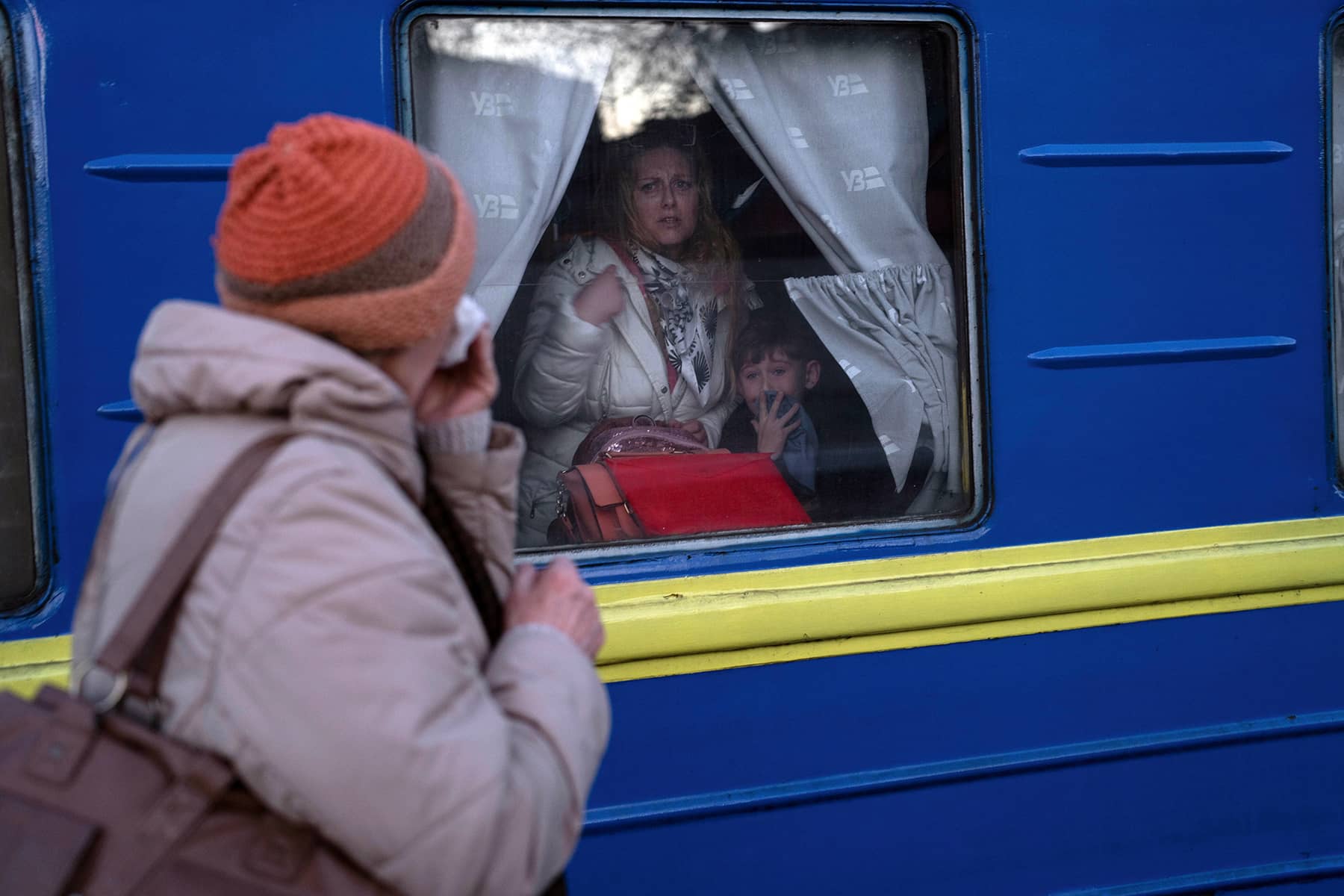
The Jewish community in Milwaukee has deep and long connections to the Jewish population in Ukraine. And for Milwaukeeans involved in relief efforts at the Ukrainian border, recent experiences of assisting refugees and evacuating Holocaust survivors from Ukraine have been harrowing and “deeply personal.”
“Keep in mind our immediate response to today’s staggering needs was not built overnight,” said Joan Lubar, chair of the Milwaukee Jewish Federation, during a virtual briefing last week. “It was built over decades. Year after year, we have worked tirelessly caring for our extended Jewish family in rebuilding a vibrant Jewish community where it all had been decimated by 70 years of communist rule.”
The briefing, held on March 31, provided an opportunity to share the stories of people who have traveled in recent weeks to the Polish-Ukrainian and Moldovian-Ukrainian borders.
When Russian troops and bombs began their assault on the civilian population of Ukraine on February 24, thousands, and then millions, of refugees began to pack whatever they could carry and flee toward the borders in the largest refugee crisis since World War II.
At least 23,000 people have died, almost 2,000 buildings have been destroyed and 10 million people have been displaced, according to a recent dispatch. The vast majority of those refugees are women, children, and elderly people, because Ukrainian men are mandated to stay and fight.
Leveraging ties to national and international organizations, members of the Milwaukee Jewish Federation sprang into action. “We were able to prepare in advance and then respond quickly and efficiently when the war broke out,” said Lubar. “From stockpiling cash and emergency supplies to preparing transport to get citizens to safety, we were ready.”
‘Deeply personal’
For Lubar, the ongoing horrors of the current war are a reminder of her family’s history in the former Soviet Union. “My grandfather, Joseph Lubar, escaped from Ukraine and came to the US when the Russian invasion began,” she said. “For many of us, the war is deeply personal. We wanted to do all we could to help our Jewish brothers and sisters in Ukraine.”
An official from United Hatzalah, an organization based in Israel, contacted Milwaukee Jewish Federation, requesting funds to transport six critically ill Jews from Ukraine to Israel. Since the war began, United Hatzalah has been providing humanitarian aid, medical treatment, and psychosocial trauma response teams at the border between Moldova and Ukraine.
“Of course we said ‘yes,’” said Lubar. “On March 31 alone, we saved six lives.” Lubar reported that her organization’s Ukraine Emergency Relief Fund has raised more than $500,000 from 600 donors.
Report from Moldova
As soon as the war began, United Hatzalah, an Israeli volunteer emergency medical services organization, assembled a team of 50 doctors, paramedics and EMTs to work in Moldova, which borders Ukraine to the south, said Dovi Meisel, vice president of operations for the group. “It was very clear immediately that there’s an influx of thousands of people pouring into Moldova,” said Meisel. “A lot of these people are coming in from five, six days on the road in the cold, sub-zero temperatures: people in hypothermia, dehydration. I’m talking about women, children, and elderly people, because the men are all left behind.”
More volunteers were called into action to establish field hospitals and take over a restaurant kitchen that pushed out 5,000-6,000 meals a day.
“These people packed up a life into a tiny little duffel bag, where they’ve walked for days, and now are waiting to move on to the next step,” added Meisel. “Now they are waiting to move on to the next step, understanding that they can’t stay lying on a mattress, in a tent, in a refugee center. We need to move them.”
To date, the organization has moved approximately 2,000 refugees on chartered flights to Israel. “Some of them will be absorbed into Israeli society,” says Meisel. “And some might move back in the future, but they cannot stay there.”
Meisel has responded to disasters in Haiti and other war-torn countries, but nothing compares with what he is seeing now, he said. “These people are undergoing a humanitarian and human catastrophe like I’ve never seen.”
Getting Holocaust survivors to safety
In addition to assisting refugees with food and medicines, Meisel’s organization has also been orchestrating evacuation of Jewish Holocaust survivors from Ukraine. The briefing included a video of one 90-year survivor’s tearful reunion with his sister in Israel.
“While this 90-year-old was eating in our soup kitchen, he was describing that the last time he was sipping soup on the run was many, many years ago when he was a young kid during the Holocaust,” said Meisel. “He was so moved and so emotional about getting to Israel. And that Torah he was holding in his hand was rescued from Odessa and brought on the flight with him.”
From Kyiv to Milwaukee
Tanya Arbit feels deeply connected to the current crisis among Ukrainian Jewish refugees. She left Kyiv in 1989 to come to Milwaukee. “I left in peacetime, without someone shelling or shooting at me or trying to blow up my home like most Jewish refugees from the former Soviet Union,” Arbit said. “I grew up with ever-present antisemitism and did not practice my Judaism until I moved to the United States.”
Arbit was reunited here with family members who had fled Russia in the 1970s. “With Federation support, my son and I were able to acclimate, integrate, and settle into our new home here in Milwaukee,” she explained, adding that since then she has been involved in several missions to Ukraine to assist Ukrainian Jews.
But nothing prepared her for what she saw on a recent mission to Poland. “What I saw and what I heard will stay with me for the rest of my life,” said Arbit. “We witnessed the unprecedented crisis where over 3 million people have left their homes in Ukraine and passed into Poland.” That number is more than twice the population of metropolitan Milwaukee. “Those are just the refugees who immigrated to Poland,” she said. “There are an estimated 10 million refugees who are seeking safety from a deadly and senseless war.”
The scene at the Warsaw train station “felt like a scene from a surreal war movie,” said Arbit. “We met mothers and children who spent nights in crowded, airless bomb shelters only to awaken from their sleep, as the shelters were destroyed by bombing. Their nearby apartment buildings were in ashes. They made it by bus or train to travel for 24 hours or more to the border of Poland. Most of them had nothing but the clothes they were wearing.Their husbands, fathers, and sons stayed behind for battle.”
Translating horror, and miracles
Because Arbit speaks Russian and some Ukrainian, she was able to speak directly to refugees and translate to other members of the group of 30 volunteers. “Each story tore my heart out again and again,” said Arbit. “One story that continues to haunt me is that of a woman named Irena and her daughter, Sophia. She’s struggling with nightmares because of the horrific things she’s encountered — from being cramped in a shelter with no electricity, heat, or bathrooms, to witnessing a friend being shot at for trying to bring water to the group.”
Irena had to tell 15-year-old Sophia that it was “time to become an adult, time to grow up” because she might not return from her work as a manicurist. “My heart bursts with that statement,” said Arbit. “A 15 year old girl is not an adult, and should still be able to enjoy the wonders of her childhood. Sophia was withdrawn, invisible, visibly pained with her, from her experience. She shared that she wants to be an artist, and she expresses her feelings through art.”
Despite the extreme suffering she witnessed at the border, Arbit says she is encouraged by the strong support shown for all refugees, and thankful for the work of Jewish Agency for Israel, which is working to resettle 6,000 Jews in Israel. “I went to witness a crisis, but what I really saw was a miracle,” says Arbit. “A miracle funded by our contributions that enable our partners to work, to save, to shelter and rebuild Jewish life. For me, this was a full-circle experience.”
A strong response to the crisis
Community donors have contributed a half-million dollars toward relief efforts, said Julie Shack, vice president of philanthropy for Milwaukee Jewish Federation. Shack, who also traveled to Poland on the mission to assist refugees, thanked the project’s benefactors. “As you have heard, the needs created by this war are staggering,” she said, adding that the need will be ongoing.
Lubar said she is grateful as well to the community that has stepped up to assist Europeans in crisis. “I take such great pride in our ability to deliver a critical lifeline, to protect and support Ukraine’s Jewish community,” she said.
Catherine Capellaro
Pеtrоs Gіаnnаkоurіs and Fеlіpе Dаnа
Originally published on the Wisconsin Examiner as Milwaukee’s Jewish Community marshals resources, volunteers to aid Ukrainian refugees
Donate: Wisconsin Examiner
Help spread Wisconsin news, relentless reporting, unheard voices, and untold stories. Make a difference with a tax-deductible contribution to the Wisconsin Examiner

